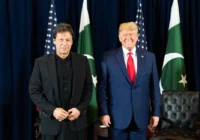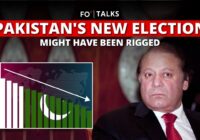In the corridors of power in Islamabad, a storm is brewing that threatens to upend the Pakistani state. This nuclear-armed nation of 250 million people is caught in a perilous struggle for supremacy between two the military establishment, which has shaped Pakistan’s destiny since its founding in 1947, and Imran Khan, the charismatic former prime minister whose populist appeal has galvanized millions.
This confrontation transcends conventional political rivalry; it is a battle over the nation’s direction and identity, with implications for stability, governance and democracy. Pakistan’s choices today will echo for decades to come.
The military and the populist
Pakistan’s military is not merely an institution, but a foundational pillar of the state. Since its birth in 1947, the military has been a guarantor of national security and unity, navigating the country through wars, internal conflicts, and natural calamities. However, this role has often extended into political governance, with the military exerting substantial influence over the state.
Of course, military intervention receives a great deal of criticism. Its defenders argue that the military has stepped in to stabilize a nation plagued by political infighting, corruption and weak governance.
This dual role — protector and power broker — has created a complex dynamic, one that often overshadows Pakistan’s democratic aspirations. This dynamic continued until the Khan’s emergence in 2018 marked a seismic shift.
A cricketing legend turned political reformer, Khan rode a wave of popular discontent to power in 2018. His Pakistan Tehreek-e-Insaf (PTI) party promised a break from the past: economic reform, accountability and an end to elite-driven politics.
However, Khan’s tenure as prime minister was polarizing. While his supporters lauded his vision for a Naya Pakistan (“New Pakistan”), critics pointed to economic mismanagement and policy inconsistencies. By 2022, Khan’s relationship with the military — once seen as a source of strength — had deteriorated, culminating in his removal through a parliamentary no-confidence vote alleged by the PTI to have been engineered by the Pakistan military.
Instead of retreating, Khan reinvented himself as an opposition leader, channeling public frustration into a potent political force. His narrative of resistance against entrenched elites resonated deeply, particularly among younger voters and the middle class.
Since August 2023, Khan has been incarcerated under a cloud of legal proceedings his party deems politically motivated. He faces over 150 legal cases.
Khan’s imprisonment has become a flashpoint for political unrest. For his supporters, these charges symbolize a broader attempt to stifle dissent and eliminate a genuine challenger to the status quo.
Despite his incarceration, Khan’s influence endures. His calls for judicial reform and fresh elections have kept his movement alive, with rallies, protests and sit-ins challenging the government’s authority. His wife, Bushra Bibi, has stepped into an uncharacteristic public leadership role, rallying PTI supporters and intensifying the push for his release.
Khan’s supporters hit the streets in huge numbers
The latest escalation came on November 24 when, upon Khan’s “final call,” hundreds of thousands of PTI supporters defied government-imposed lockdowns to march toward Islamabad from the four corners of Pakistan, demanding Khan’s release from prison, among other demands.
On Sunday, thousands of supporters launched a march from Peshawar, led by Bushra Bibi, Khan’s wife, and Ali Amin Gandapur, a prominent ally and chief minister of Khyber Pakhtunkhwa. Demonstrators removed barricades and shipping containers set up by authorities. The government has justified its actions as necessary to maintain order, accusing the PTI of inciting chaos. The Interior Minister Mohsin Naqvi has openly threatened to fire upon pro-Khan protestors if the capital lockdown is breached.
The clashes have turned violent, resulting in casualties on both sides. Authorities have responded with mass arrests, internet shutdowns, barricades and shoot-on-sight orders to prevent protesters from reaching D-Chowk, a symbolic venue for political demonstrations.
The PTI, in turn, argues that these measures reflect a broader erosion of democratic freedoms. The result is a nation on edge, with Islamabad resembling a city under siege. Undeterred by governmental threats, Khan’s supporters have vowed to stage a sit-in in the capital to press for his release.
At the time of writing, no side seems to be budging from its maximalist position. The PTI has categorically proclaimed that negotiations with the government are conditional on the prisoner’s release.
The stakes in this political deadlock are extraordinarily high. Political instability could trigger an economic collapse and precipitate a full-blown currency crisis, leading to severe social and economic disruptions. The potential for civil unrest is real, with regions such as Khyber Pakhtunkhwa and Balochistan — long plagued by their own issues — standing on the edge of serious disturbances. The specter of violence and instability looms large, casting a shadow over the nation’s future.
Adding to the urgency is the international community’s lack of appetite for intervention. With global attention consumed by a myriad of conflicts and geopolitical risks, Pakistan’s plight risks being relegated to the periphery. The international community’s reluctance to bail out a nation embroiled in chronic issues — a proverbial “problem child” — only exacerbates Pakistan’s vulnerability. But the world cannot ignore Pakistan’s woes, albeit those are never-ending and perpetual.
As Pakistan faces these unprecedented challenges, the next few days will be crucial. The choices made by the key actors — the military establishment, the current government and Khan — will determine the nation’s trajectory. A failure to address the root causes of the crisis could lead to a situation far worse than that faced by Sri Lanka or Bangladesh, where political and economic turmoil would engulf the country, leading to widespread suffering and instability. The ongoing protests could be the tipping point.
Above all, the military’s entrenched power and the government’s resistance to political reform create a standoff that leaves little room for compromise. Yet, this deadlock cannot continue indefinitely. The political rupture facing Pakistan today demands a collective reckoning — a recognition that the current path is untenable and that a new, inclusive approach to governance is urgently needed.
The views expressed in this article are the author’s own and do not necessarily reflect Fair Observer’s editorial policy.
Support Fair Observer
We rely on your support for our independence, diversity and quality.
For more than 10 years, Fair Observer has been free, fair and independent. No billionaire owns us, no advertisers control us. We are a reader-supported nonprofit. Unlike many other publications, we keep our content free for readers regardless of where they live or whether they can afford to pay. We have no paywalls and no ads.
In the post-truth era of fake news, echo chambers and filter bubbles, we publish a plurality of perspectives from around the world. Anyone can publish with us, but everyone goes through a rigorous editorial process. So, you get fact-checked, well-reasoned content instead of noise.
We publish 2,500+ voices from 90+ countries. We also conduct education and training programs
on subjects ranging from digital media and journalism to writing and critical thinking. This
doesn’t come cheap. Servers, editors, trainers and web developers cost
money.
Please consider supporting us on a regular basis as a recurring donor or a
sustaining member.
Will you support FO’s journalism?
We rely on your support for our independence, diversity and quality.







Comment